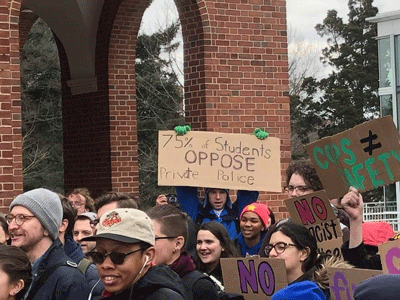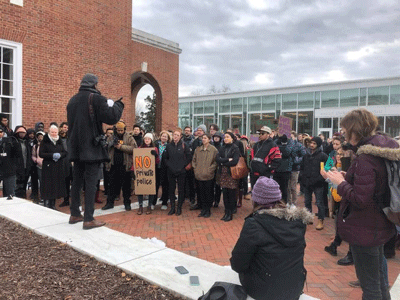State representatives are expected to vote on a bill that would allow Johns Hopkins University to create a private police force on Thursday, March 7, 2019. Delegate Cheryl Glenn (D-45) and State Senator Antonio Hayes (D-40), both of whom represent Baltimore City, are sponsoring the bill in the House of Delegates and State Senate respectively.
After an unsuccessful bid to pass a similar bill last year, the university is trying again to gain needed legislative support. At press time, neither sponsor had responded to requests for comment from The Baltimore Times.
The portion of the bill authorizing a private Johns Hopkins police force, however, has sparked controversy in the University community and beyond. University faculty released a letter in opposition to the bill signed by 68 faculty members on February 18, 2019.
“We do not support the creation of a police force that is not accountable to the citizens of the city where it operates,” the letter reads. English and History professor Lawrence Jackson, a Baltimore native and co-author of the faculty letter, added that the measure has the potential to increase surveillance and tension in the surrounding neighborhood.
“When I became a teenager here in Northwest Baltimore I began having violent and deeply traumatic encounters with the city’s police,” he said in a statement during a policing forum last year. “For me, at a deeply reactionary level, I find it difficult to resolve problems by applying more police force.”
Controversy over the bill has also permeated the student body. Shortly after the proposal of last year’s bill, a coalition of graduate and undergraduate students created a campus organization called Students Against Private Police. One of the group’s organizers, sophomore Barae Hirsch, spoke to The Baltimore Times about the group’s concerns.
“One of the things that has become really clear over the course of this year-long battle is that Hopkins is proceeding with this endeavor in a completely undemocratic fashion,” she said. “Our ideal would be for Hopkins to invest in community organizations and initiatives that provide the underlying stability that helps give rise to decreasing crime.”
Courtesy Photo/Students Against Private Police
Students gather on Johns Hopkins’ Homewood campus in protest of the private police bill on February 13, 2019.
“There’s no saying exactly what the effects [of a private police force] would be, but in the event of possible police brutality or possible harassment or profiling, the accountability is extremely lacking,” she added.
In a paid Twitter post being promoted to community members online, the University offers a different analysis.
“The Johns Hopkins police department proposed in SB 793 and HB 1094 would be public-facing, public-serving, and publicly accountable,” the post reads. University President Ronald Daniels also stated his commitment to addressing community concerns in a letter to Johns Hopkins students, faculty and staff on December 21, 2018.
“We recognize the legitimate and deeply held concerns, particularly from our students and faculty of color and in the LGBTQ community, about bias and injustice in policing. We take our obligation to prevent and address these wrongs extremely seriously,” the letter stated.
Hirsch, however, argued that attempts at opposition to the bill have been stifled by inaccessible public meetings, insufficient time for sharing community concerns, and the logistical difficulty of making students voices heard by both the University administration and lawmakers in Annapolis.
“All of the efforts at open discussion have been purely for optics,” she said.
A poll conducted by Johns Hopkins’ student government suggests that as many as 75 percent of students oppose the introduction of private police on campus.
Also included in the current bill are provisions to create and fund a Law Enforcement Apprenticeship Cadet Program at the state level. Its goals are to train early-career law enforcement officers and improve youth relationships with police.
This measure comes on the heels of a July 2018 bid by Mayor Catherine Pugh to establish a similar program in Baltimore City. According to a press release, “Mayor Pugh has made reviving the long-dormant BPD Cadet program a top priority over the past year.”
These provisions, however, are not enough to inspire support from the bill’s critics.
“We view the inclusion of those articles as really deceitful and pernicious, because they basically cloud the intention of the bill,” said Hirsch, speaking on behalf of the Students Against Private Police group. “Our position is no private police. No amendments, no compromises.”

